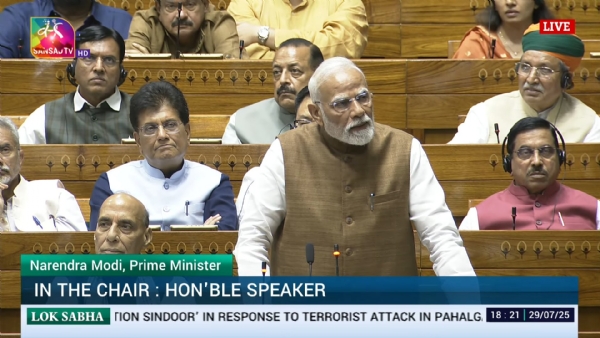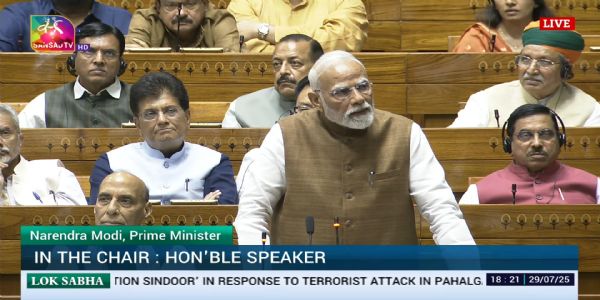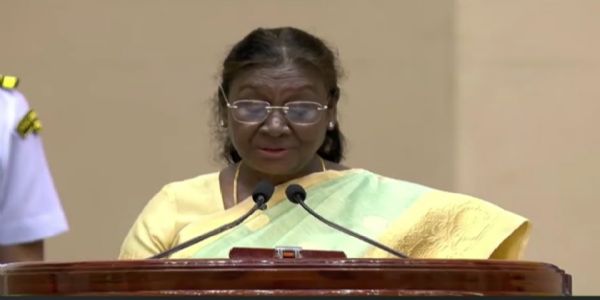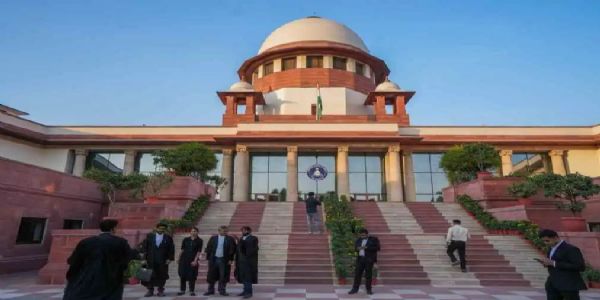
Delhi, 29 July (H.S.): During the debate on Operation sindoor on Tuesday, PM Narendra Modi characterized the Parliamentary session as a victory celebration, highlighting India's military success against Pakistan's terror networks. He noted this celebration is in recognition of overcoming terrorism and fulfilling commitments, referring to the 'sindoor' as a symbolic representation of India's resolve and unity, encompassing 140 crore Indians.
PM Modi asserted that following the Pahalgam terror attack, the masterminds behind such actions can no longer rest easy, indicating a shift in India's approach to responding to terrorism. He emphasized that no external pressures hindered India's operations, arguing that the opposition merely generates media attention without winning public support.
The Leader of Opposition, Rahul Gandhi, criticized the government for lacking political will and claimed that the Armed Forces were not granted full operational freedom. He pointed out that communication from the Centre indicated restraint in targeting Pakistan’s military infrastructure during Operation Sindoor, leading to losses that resulted from these political constraints.
In opening the debate, Union Home Minister Amit Shah revealed that three of the slain terrorists involved in the Pahalgam attack were neutralized in Operation Mahadev, a joint effort by security forces. He underscored the confirmed identifications of these individuals as responsible for the earlier assault.
PM Modi further asserted that while India garnered worldwide support in its military endeavors, the Congress party's approach discredited the valor of Indian soldiers. He labeled opposition critiques as politically motivated and detrimental to military morale. PM Modi stated, “We now respond on our own terms,” emphasizing that India treats both state actors and terror masterminds equally in its responses. He noted that support for Pakistan in international forums was minimal, with only three countries backing them at the UN.
He underscored a paradigm shift in India's military strategy that now places complete autonomy in the hands of armed forces, providing them with unbridled freedom to execute operations against terror threats. PM Modi expressed pride in the armed forces, asserting that they were tasked with decisive operations that inflicted significant damage on Pakistan's terror infrastructure, which he described as a new normal for India.
PM Modi reflected on past threats from Pakistan, recalling how the country sought to intimidate with nuclear threats but was met with India's decisive response. The operations, particularly on May 6-7, were framed as a robust counter to provocations, effectively neutralizing threats with outstanding precision. He declared that through Operation Sindoor, the Indian military not only retaliated but also demonstrated advanced technological capabilities, striking meaningful targets and establishing a precedent for future responses.
He referenced the operational success against terror headquarters across Pakistan, asserting it marked a historic shift in India's engagement strategy. PM Modi contended that past criticisms from the opposition, questioning his leadership during military crises, had only emboldened adversaries and eroded the morale of the Indian forces. Highlighting a clear narrative, he called out the need to unify against terrorism rather than engage in divisive politics, urging respect for the armed forces.
Moreover, PM Modi remarked on the dimensions of Indian operations, suggesting they span from 'Sindoor to Sindhu' (Indus), portraying a vast theater of operations and asserting that Pakistan would face severe repercussions for its actions. He reiterated that India's military strategy has evolved and will persist in responding to threats incisively and decisively, marking a crucial evolution in India's defense posture.
The Prime Minister's assertions during the debate reflect a broader commitment to confronting terrorism and a call for national unity in supporting the armed forces, while challenging the opposition's narrative on national security. The emphasis on operational autonomy and decisive retaliation underlines Modi's administration's stance on ensuring the safety and security of India against external threats.
PM Modi described how Pakistan's DGMO reached out for mercy after suffering substantial losses, stating, don't hit us anymore, we can't suffer any longer. He highlighted that no international leaders urged India to halt its operations, emphasizing the decisive nature of India’s response to any aggression from Pakistan. Modi recalled a tense exchange with the US Vice President, who warned of a potential significant attack from Pakistan, to which PM Modi firmly responded that any attack on India would result in an even stronger counterattack.
PM Modi criticized the Congress party for allegedly leaning on Pakistan for support and claimed they have become advocates of Pakistani narratives while acknowledging surgical strikes carried out by the Indian armed forces. He noted that Congress initially demanded proof of these strikes but shifted their stance upon recognizing public sentiment. He remarked on the false hope among Congress members concerning the capture of pilot Abhinandan, suggesting their disappointment once he returned safely.
In his speech,PM Modi drew comparisons between the emotional responses of Pakistan's terrorists and those of Congress leaders, asserting a longstanding negative posture of Congress toward the armed forces and painting them as convivial with Pakistan. He assured that India's air defense systems had effectively thwarted Pakistan's missile and drone attacks, demonstrating India's military capability.
PM Modi accused Congress of operating under Pakistan's influence, particularly citing a controversy sparked by Congress MP Praniti Shinde, who referred to Operation Sindoor as a 'tamasha.' He criticized Congress for further questioning India's military operations, specifically Operation Mahadev, which targeted those behind the Pahalgam attack. PM Modi contended that Congress must take accountability for historical losses, especially concerning Pakistan-occupied Kashmir, and lamented previous opportunities missed under Congress governance that could have reclaimed those territories.
He reproached the Indus Water Treaty, established by Nehru, which he argued allowed Pakistan to control a vast majority of the shared river resources, deeming it a grave blunder. PM Modi underscored that this agreement deeply affected India's water resources and criticized Congress for failing to rectify these past errors.
In addressing contemporary security, PM Modi strove to counteract any narratives that might undermine public confidence in the government’s commitment to national security, asserting that India will take definitive actions against terrorism until Pakistan ceases its hostilities. He concluded his address by warning Congress against providing leniency to Pakistan, urging them to amend their historical errors to support India’s assertive stance on national defense and regional security.
---------------
Hindusthan Samachar / Indrani Sarkar







